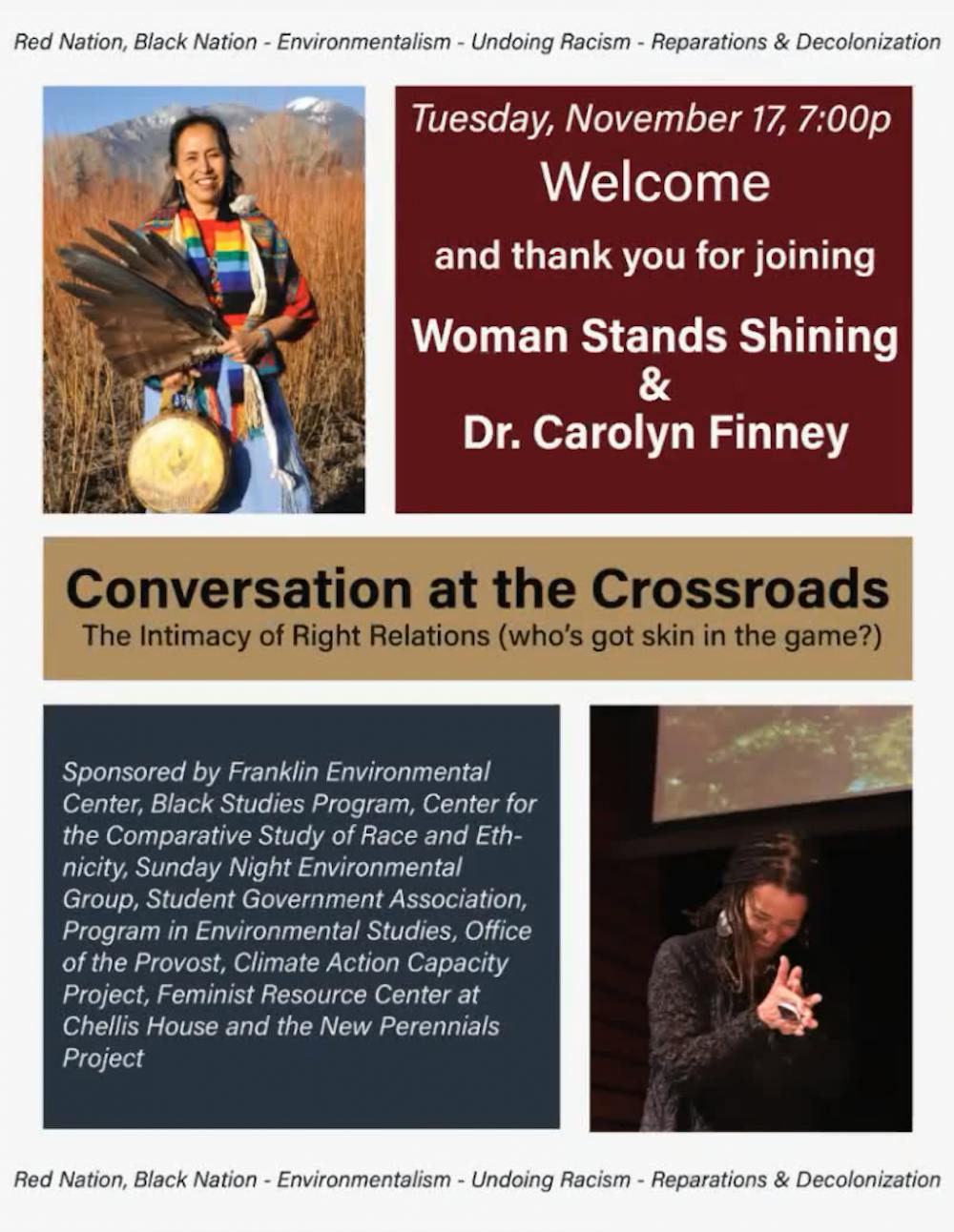 Students were asked to look at their relationship with land through a new lens during a discussion between Professor Carolyn Finney and Woman Stands Shining (Pat McCabe), a Diné (Navajo) artist and activist. The two discussed their insights about race, environment, right relations and the intertwining narratives of Native Americans and Black Americans with the Middlebury community.
Students were asked to look at their relationship with land through a new lens during a discussion between Professor Carolyn Finney and Woman Stands Shining (Pat McCabe), a Diné (Navajo) artist and activist. The two discussed their insights about race, environment, right relations and the intertwining narratives of Native Americans and Black Americans with the Middlebury community.
McCabe, also a Diné writer and ceremonial leader, and Finney, an African-American storyteller, activist and scholar-in-residence at Middlebury College, discussed land acknowledgement for Abenaki people during a Nov. 17 talk entitled “Conversation at the Crossroads: The Intimacy of Right Relations (Who’s got skin in the game?).” Divya Gudur ’21 and Gabe Desmond ’20.5 moderated the conversation.
Finney kicked off by posing the question, “What interests us in showing up to a conversation like this?” It sparked an immediate discussion of both the history and current condition of Black and Indigenous women in America, reflected in the two women’s anecdotes and lived experiences.
Finney and McCabe focused on the concept of place. McCabe explained that there is a “deep relationship” between earth and human beings that leads to a “symbiotic way of life [and] of thriving.”
The two women shared stories of displacement, both from the history of slavery and the genocide of Native Americans and stealing of Native land. While the experiences of the two groups are unique and distinct, both had to learn how to live apart from the land with which they had a connection.
Finney, who was adopted as a child, explained that she cannot point to her exact genealogy, which is a disconnect from land in its own right.
McCabe discussed her family’s experience in schools that were created to assimilate Indigenous Americans into the “American society,” further disconnecting children from the histories and places of their ancestors.
The speakers also discussed how a person can struggle to be connected to a place where they are constantly told that they do not belong — a question that too often applies to both Indigenous Americans and Black people in the United States.
Both speakers demonstrated how the stories of Black and Indigenous people in America are deeply parallel, sharing themes of land and displacement.
“[Indigenous people and Black people] should be natural allies … but we have been systematically pitted against each other, and yet we carry some very similar wounds,” McCabe said.
In an emotional moment, Finney touched on the regrettable need to have these discussions. “We are still having this conversation about basic humanity… [and] it’s deeply problematic,” she said.
McCabe and Finney both emphasize that “Black nation” and “Red nation” — as they called it — are more similar than is often seen. Unfortunately, opportunities to have conversations of intersectionality and take down those walls are few and far between, they explained.
McCabe said that the conversation at Middlebury was important, powerful and timely. The more conversations like these that we have and the more risks that we take through these conversations, the more our community will benefit, she explained.
“I hope we are inspiring many more conversations [and] some risk-taking to have this conversation,” McCabe said.
Carolyn Finney and Woman Stands Shining explore race and displacement

Comments



